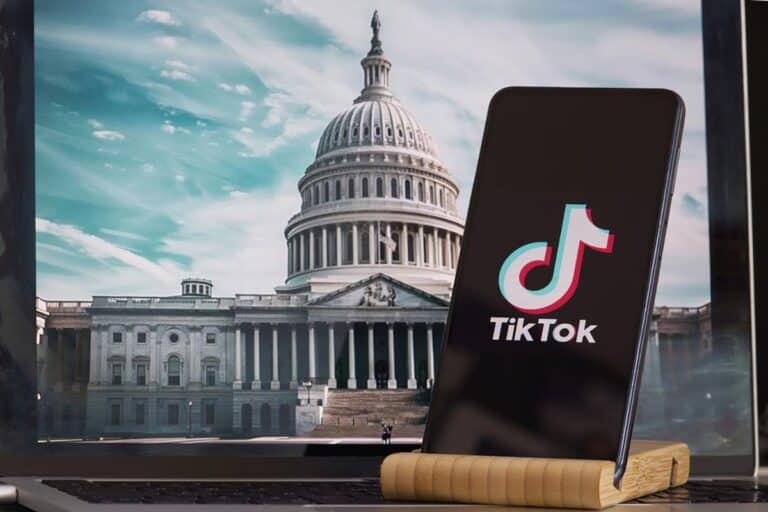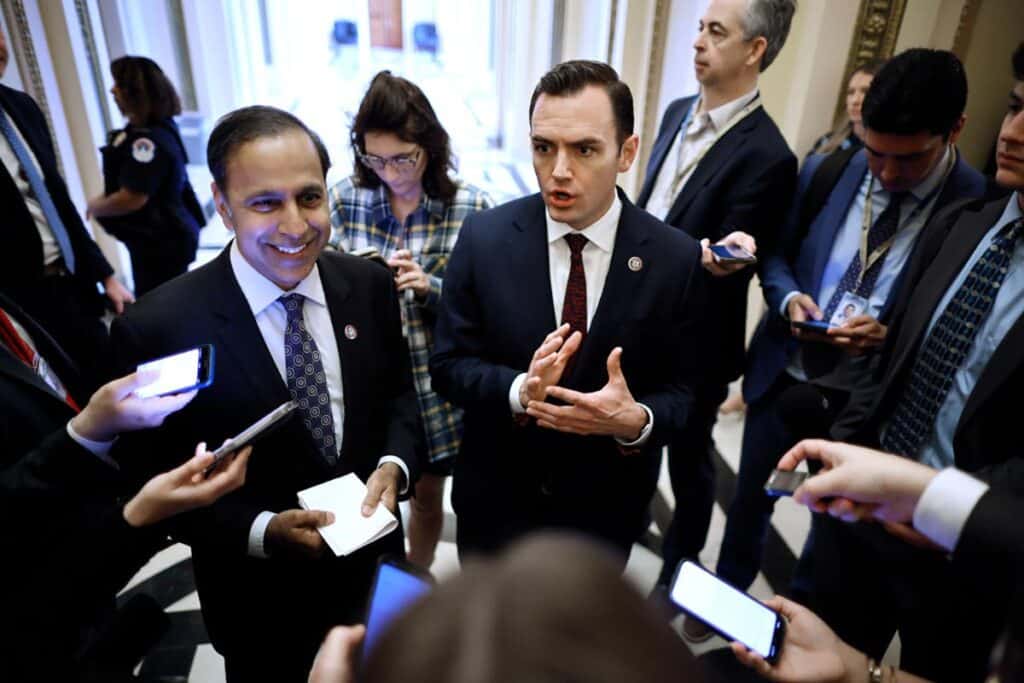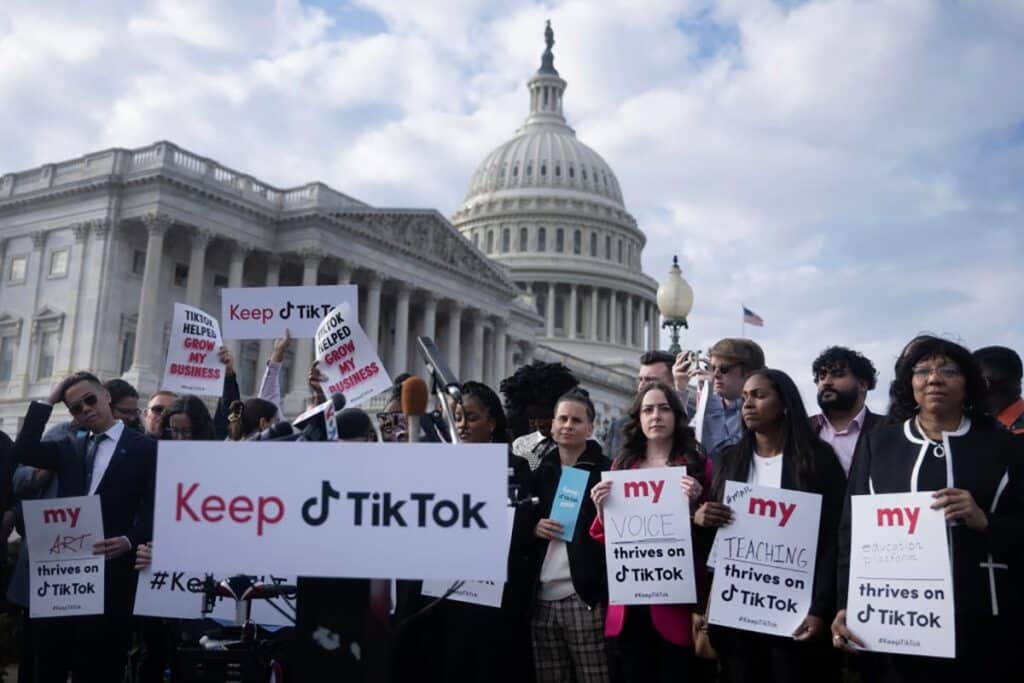
With overwhelming bipartisan support, the House of Representatives voted to pass a bill that would force TikTok to sell its app or face a ban in the United States.
Although the bill faces a challenging path in the Senate, U.S. President Joe Biden has stated he would sign it into law if it passes.
Security experts have raised concerns about Chinese policies requiring TikTok, used by over 100 million Americans, to submit user information upon request.
Experts fear that the Chinese government is using TikTok to collect American users’ data, and could leverage the app’s powerful algorithm to push stances supported by the Chinese government and skew American public opinion.

However, some creators and influencers are promoting a very different narrative, blaming the potential ban not on China or the potential security concerns, but on…the Jews.
Conspiracy theorists argue that the push for the TikTok ban stems from the fact that the social media platform is overwhelmingly pro-Palestine. They believe that Jewish and pro-Israel groups have convinced legislators to support the ban by threatening to withdraw funding.
This theory is a modern manifestation of age-old tropes suggesting that Jews “control” various aspects of society and are responsible for whatever society deems to be abhorrent at any given time.
AIPAC had nothing to do with the House bill forcing a sale of TikTok. Nothing.
— Ritchie Torres (@RitchieTorres) March 14, 2024
Blaming AIPAC for everything you find disagreeable is antisemitism at work. pic.twitter.com/Vp4qZE4vPJ
Let’s explore how the potential TikTok ban ignited this conspiracy and how it reflects long-standing stereotypes.
Read more: What does Jewish Gen Z think of the potential TikTok ban?
The start of an antisemitic conspiracy theory
Immediately after the House passed the controversial bill, some TikTok users and far-right and far-left media blamed pro-Israel lobbyists for the measure, claiming that AIPAC and similar groups are supporting the bill in order to “censor” pro-Palestinian voices online.
A foreign government is influencing the 2024 election. I'm not talking about China, but Israel.
— Briahna Joy Gray (@briebriejoy) March 13, 2024
In a leaked recording, ADL head Jonathan Greenblatt admitted that Israel had a "TikTok problem." Suddenly, a divided congress agrees on one thing: A social media ban.
More here:…
Many on the far-right and far-left — including far-right influencers Lucas Gage and Vincent James and streamer and influencer Haz Al-Din — claimed that pro-Israel lobby American Israel Public Affairs Committee (AIPAC) was behind the push for TikTok’s ban, citing the large number of pro-Palestinian videos on TikTok.
Conservative commentator Candace Owens recently publicized this idea on her Daily Wire show, arguing that the TikTok ban will be blamed on Jews.
She noted that The Jewish Federations of North America, a prominent Jewish organization, announced their support for TikTok’s ban, citing the surge in antisemitism on the platform.
Owens said to her viewers, “Don’t fault me for telling you the truth. If TikTok is in fact banned, there is no question that Israel will be blamed, AIPAC will be blamed, the ADL will be blamed, Jews are going to be blamed for a social media app being removed.”
She shared a video from a content creator promoting this antisemitic idea, saying that the country that was trying to control Gen Z was “Israel, not China.”
In the video, a statement from ADL CEO Jonathan Greenblatt appears to be heavily doctored with edits that distort his voice and an unflattering photo accompanying the audio. Greenblatt and the ADL have said neither would support the TikTok ban.
In a not-so-subtle “warning” to the Jewish community, she said that banning TikTok would only prove these conspiracy theorists correct.
For her continued promotion of antisemitic theories — and defense of Kanye West’s antisemitic statements — Owens was fired from the Daily Wire after liking a tweet that said her longtime critic Rabbi Shmuley Boteach was “drunk on Christian blood.”
Candace Owens wasn’t the only one to promote this antisemitic conspiracy.
Former Florida Democratic congressional candidate Pam Keith blamed AIPAC for the TikTok ban, saying, “Wow! I am f–king SHOCKED that Dems are voting to ban TikTok. This is AIPAC at work.”
After Jewish Rep. Debbie Wasserman Schultz (D-Florida) voted in support of the bill, her failed 2020 and current 2024 opponent, Jen Perelman, wrote: “Could it be why AIPAC lobbyists were meeting with reps yesterday?”
MMA artist and far-right influencer Jake Shields — who was one of the main proponents of the #BanTheADL campaign — also said that the ADL and AIPAC were behind the ban. Shields claimed that Republican Rep. Dan Crenshaw supported the bill because he is supported by AIPAC.
White House spokesperson John Kirby recently affirmed that pro-Israel lobbyists were not behind the TikTok ban.
“Our national security concerns have to do with its ownership by a Chinese company,” Kirby said, when asked about the role of pro-Israel organizations in the potential ban. “It is not about the First Amendment, freedom of speech or the content itself. It’s about divestiture.”
TikTok ban conspiracy theories: Echoes of age-old antisemitic tropes
The conspiracy theory that Jews are “behind” the TikTok ban is a modern manifestation of the age-old antisemitic trope that Jews control everything from governments to media to business, allegedly using this “control” for nefarious purposes.
This trope originated in 18th- and 19th-century Russian antisemitism, notably propagated by Jacob Brafman, a Russian Jew who converted to the Russian Orthodox Church after a falling out with his local Jewish community.
In his work, “The Local and Universal Jewish Brotherhoods,” Brafman claimed Jewish organizations were coordinating an internal Jewish conspiracy, a narrative that laid the groundwork for the infamous “Protocols of the Elders of Zion.”
“The Protocols of the Elders of Zion” is a fabricated antisemitic text describing a Jewish plan for global domination, including control of the media and financial institutions.
While the book was proven as a forgery as early as 1921, it became an enduring source of inspiration for antisemitic conspiracy theorists around the world — even today. To learn more about the origins of these conspiracies, watch our video:
Conspiracy theorists have long believed that Jews and pro-Israel lobbyists use financial influence to control Congress and advance legislation to support Jews.
A prominent modern target of such theories is Jewish billionaire George Soros, who is often depicted as a puppet master manipulating global events for his own personal gain. These theories evoke historical, antisemitic tropes of Jews “controlling” banks and exerting covert influence over society.
In the context of the TikTok ban, this conspiracy theory alleges Jewish control over the fate of the social media platform.
Jews as “the eternal scapegoat”
The conspiracy theories asserting a Jewish role in the potential TikTok ban also reflect the historical reality of Jews as “the eternal scapegoat” of society.
In this phenomenon, Jews (and today, the Jewish state) are often blamed for what the public deems to be the worst features of a society at a given time.
In this case, Jews are being scapegoated for the perceived loss of the popular app, with the platform being viewed as a positive aspect of society and its potential ban as a negative one.
The antisemitic belief that Jews are to blame for all the world’s ills was mobilized by Adolf Hitler and the Nazi party, who infamously blamed Jews for a range of problems, including Germany’s economic struggles during the Great Depression.
Going further back, at the turn of the 20th century, American author Mark Twain explored this phenomenon in his essay “Concerning the Jews,” where he discussed how the Habsburg Empire used the scapegoating of Jews to forge a national identity and deflect blame for the empire’s woes away from its monarchs.
In the present-day context, American legal scholar Noah Feldman recently wrote about the resurgence of this phenomenon in relation to the Israel-Hamas War.
He observed in Time Magazine that “Antisemitism’s capacity to keep its familiar character while also channeling new fears is what confers its stunning capacity to reinvent itself. In each iteration, antisemitism reflects the ideological preoccupations of the moment in antisemitic discourse. Jews are always made to exemplify what a given group of people considers to be the worst feature of the social order in which they live.”
TikTok ban conspiracy theories: antisemitism and misdirection

One of the conspiracists tweeted, “It’s very clear TikTok is being banned for Israel, not because of China.”
However, these theories obscure and distract from what the issue is really about.
Critics of TikTok, including FBI Director Christopher Wray and national intelligence director Avril Haines, have raised concerns that TikTok’s algorithm pushes political propaganda aligned with Chinese government positions.
Calls to ban TikTok and efforts of the U.S. government to curb TikTok usage have been taking place for years, predating Oct. 7.
In January 2020, the U.S. Navy and Army banned TikTok on government devices due to security risks.
The first nationwide TikTok ban proposal came in 2020 from then-President Donald Trump, who claimed that the app was a security threat. However, no action followed these threats, despite Microsoft’s interest in acquiring the company.
In 2022, a ban of Russian- and Chinese-owned social media companies was proposed, and President Biden banned TikTok on federal government-owned devices. The Senate shot down a similar ban in Jan. 2023, along with other acts aimed at forcing TikTok’s sale in February and March of that same year.
Subsequently, Biden called on ByteDance to sell TikTok, and investigations by the Department of Justice and FBI were initiated.
Despite numerous other attempts to ban TikTok for national security reasons, conspiracy theorists have latched onto theories involving Jewish lobbyists and the ban.
Additionally, as with virtually all issues, the Jewish community does not have a uniform opinion on this matter. There has been significant debate within the Jewish and pro-Israel world about the importance of free speech and the ethics of banning TikTok.
National security officials maintain that TikTok poses a threat due to its potential to spread propaganda and compromise the information security of American users based on its ties to the Chinese government.
While there are arguments about the implications for free speech, as a ban would shut down a global communication platform, the debate should focus on balancing national security and freedom of speech, rather than being derailed by unfounded conspiracy theories about Jewish influence.
Read more: What does Jewish Gen Z think of the potential TikTok ban?
